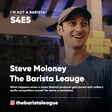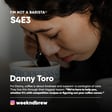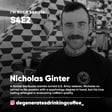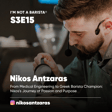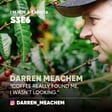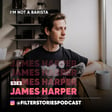
S3E14: From Barista to Barista Trainer: Andrew Jay’s Journey of Growth and Resilience.
In this episode of the I’M NOT A BARISTA podcast, we catch up with Andrew Jay, a passionate coffee professional, who shares his inspiring journey from being a barista to becoming a regional coffee trainer. Andrew opens up about the challenges he’s faced, including imposter syndrome, the impact of the pandemic on his business dreams, and the fine line between his professional and personal love for coffee. We discuss the importance of every coffee story, no matter where you are in your journey—don’t let your current stage blind where you want to be.
Join us as we explore Andrew’s story of growth, resilience, and the pursuit of new opportunities in the ever-evolving coffee industry. Plus, hear about his exciting plans for the future and how he’s balancing his love for coffee with a potential career as a writer. Don’t miss this honest and heartfelt conversation that reminds us all why every coffee story matters.
Make sure to follow Andrew on Instagram here.
